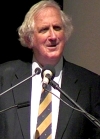Geoffrey Blainey

Geoffrey Blainey, a practising historian for some sixty years, has written on Australian and world history. Long attracted to museums, he was deputy chairman of the Whitlam government's Enquiry into Museums and National Collections in 1974–75. Later, he served on the board of the Australian War Memorial for seven years. His book, The Causes of War (1973, 1988), is debated in military academies and in US universities.
For maybe one century the subject called Economics was monarch of the social sciences. Then the Western world was poorer than it is now, and many economists promised to find a pathway towards the abolition of hunger and unemployment. They also hoped to abolish war: the eager ideologies of free trade were believed by their disciples to be long-term recipes for international peace.
This Little Hist ... (read more)
Charles Bean is now seen as one of the classiest journalists and historians Australia has produced. Like many talented historians, he had no prior training in his craft, except as a war correspondent during World War I, when he wrote in the face of daily and nightly dangers such as most war journalists no longer have to confront.
I have the strong impression that when I first tried to be a histor ... (read more)
This impressive collection of knowledge ranges from the history of newspapers and the biographies of radio and television stars to the rise of media owners (the first of whom, Andrew Bent, arrived as a convict in 1812). It covers war reporting, food and sports coverage, children’s radio, blogging and podcasting, and even the life of the radio serial Blue Hills, which ran from 1949 to 1976.
... (read more)
Rupert (‘Dick’) Hamer proved to be one of Australia’s most innovative premiers. One sign of his unusual prestige is that this history of his life and times has perhaps been publicly praised more by Labor leaders than by his own Liberal colleagues.
Hamer’s family background was in the church, law, business, and politics. His paternal grandfather was the minister of the wealthy Independent ... (read more)
The author of this impressive book had his ninetieth birthday this January. Born to a Jewish mother and Catholic father, he was fortunate to escape death in his native Hungary in World War II and to live another existence in the United States as an intellectual and historian throughout the Cold War. The label he sometimes claims is ‘reactionary’, but this is too simple for such a thoughtful sp ... (read more)
The Australian War Memorial has become a kind of national cathedral. Those who visit Canberra for the first time feel that they must see it. It fascinates nationalists, those who are entranced by past wars, those who love displays of technology, relatives of the war dead, those attracted to family history, and the countless visitors who unknowingly seek heroes outside the sporting and theatrical a ... (read more)
This bold book, with its lucid prose and vivid illustrations, will be discussed for years to come. It is not original in the narrow sense of the word, but it takes an important idea to new heights because of the author’s persistence and skill. Bill Gammage, an oldish and experienced historian of rural background, looks at nearly every region of Australia, its surface landscape and vegetation. Hi ... (read more)
